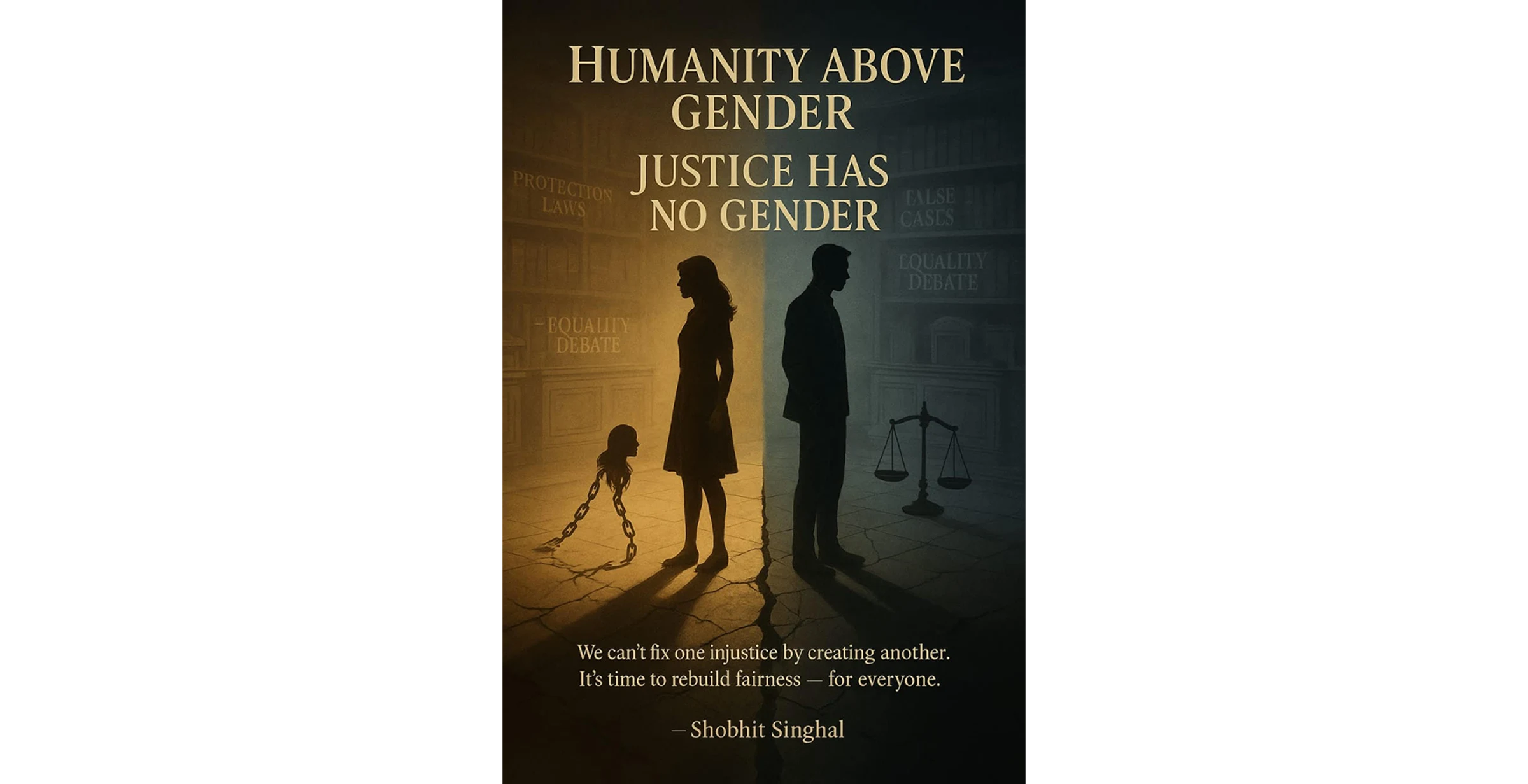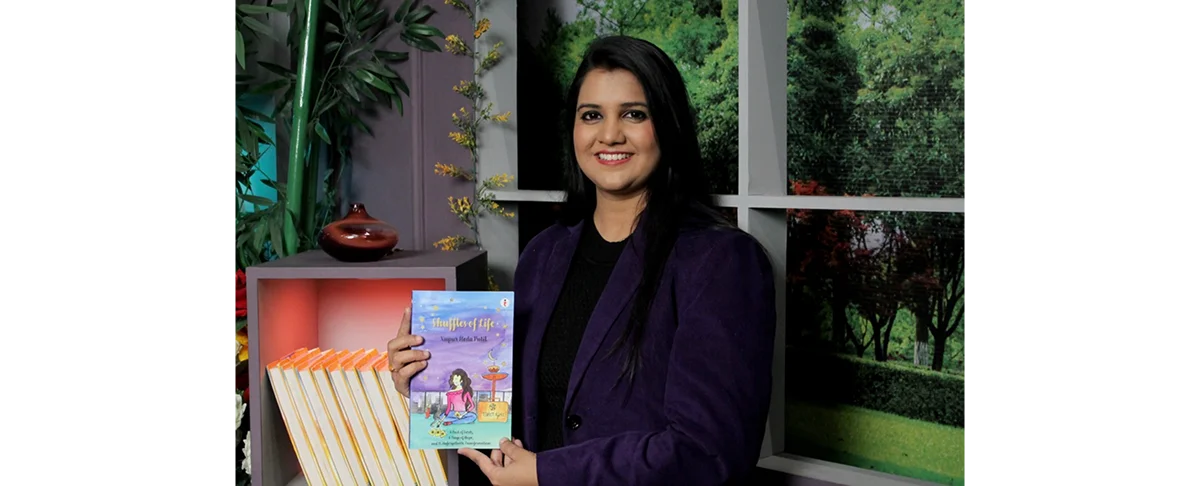It’s Time to Talk About Humanity — Not Just Gender
I was twelve years old when I lost my mother. That loss shaped my understanding of pain, compassion, and resilience.
I grew up with two sisters—strong, capable women who have been my anchors through every storm. I have worked with dozens of women as clients, colleagues, and friends. Their integrity, intelligence, and empathy inspire me every day.
If anything ever happened to them—if they faced harassment, violence, or injustice—I would be devastated. I would stand with them, fight for them, do everything in my power to protect them.
Because I don’t just see gender. I see human beings.
When Compassion Becomes Selective
And yet, another phenomenon has been quietly growing in our society—a kind of reverse injustice that few are willing to acknowledge.
In the name of protection, we have built systems that sometimes forget fairness. We have enacted laws to safeguard one gender so decisively that, unintentionally, the other gender may become vulnerable in certain situations.
I am talking about the state of men in India today—not from a place of bitterness, but from a place of balance.
The Origin of the Imbalance
Let’s be honest—women in India have faced immense hardship for centuries. They were denied property rights, excluded from education, silenced in public life, and confined to domestic roles.
So, when India gained independence, lawmakers took a deeply noble step—they sought to correct that history by creating laws to protect women, ensure they were no longer victims of systemic injustice.
And it worked: women began entering universities, offices, leadership roles. A society that once silenced them started to hear their voice.
But somewhere along the way, a protection law became a power instrument. And when a protection law can be misused without consequence, it stops being protection—and starts tipping into discrimination of another kind.
The Legal Reality
Our current system has several laws that are gender‐specific rather than gender‐neutral.
For example:
- Section 498A of the Indian Penal Code (IPC) was introduced to protect women from cruelty by husband/relatives in the context of dowry. In 2018, over a hundred thousand cases were registered under 498A—making up about 27 % of all crimes against women. Conviction rates are very low (in the range of 13-15 %) meaning many accused go through long legal processes without a verdict in their favour.
- The Protection of Women from Domestic Violence Act 2005 (PWDVA) applies only to women victims of domestic violence—there is no equivalent law explicitly covering men as victims.
- Studies show men also experience domestic violence—one large NFHS-based study found that husbands in some states reported physical violence by their wives or in-laws.
- Regarding suicides: The National Crime Records Bureau (NCRB) data show male suicide rates are significantly higher than female rates in India—e.g., 14.2 per 100,000 for men vs 6.6 for women in one analysis.
The result is clear: by building laws and protections that assume one gender is always the victim and the other always the perpetrator, we have created an asymmetric justice system. Not out of malice—but out of inertia. We changed society, but didn’t update all the systems to reflect that change.
Why There’s Limited Redress for False Accusations
One of the most painful parts? When a false case devastates a man’s life, there is almost no automatic legal accountability for the accuser.
Why? Because the law was drafted with the assumption that women are vulnerable and men are inherently safe. Courts may hesitate to penalise women for fear of discouraging real victims. That’s understandable—but it’s also unfair.
There is no automatic penalty for filing a false complaint under 498A. The man has to initiate a separate case under e.g., Indian Penal Code Section 182 (false information) or Indian Penal Code Section 211 (false charge with intent to cause injury)—a process that itself takes years, drains emotional and financial resources of an already broken person.
In one noted case, the Supreme Court of India in 2025 quashed a 26-year ordeal of a husband wrongly imprisoned under 498A and noted that the FIR was vague and unsupported by credible evidence.
The Larger Social and Psychological Picture
The legal imbalance is only one layer. Beneath it lies deep cultural and psychological conditioning. Society still often sees women as “the weaker side.” So when a woman speaks, there’s an instinctive inclination to believe her. When a man speaks, the burden to prove he is suffering is often much higher.
That’s not empathy. That’s bias disguised as compassion.
The result: even in cases of male victimhood, men are rarely seen as victims. They’re often seen as potential offenders who “must have done something.”
And this is the dangerous generalisation that happens when one group is blamed for the wrongdoing of one person. When one man hurts a woman, the suspicion can extend to every man. That is not justice. That is prejudice. And prejudice, no matter who it targets, is always wrong.
The Role of Media and Public Narrative
Media plays a massive role in shaping perception. Headlines about “husband tortures wife” flood prime-time news. But when the same man is acquitted years later, it rarely makes a headline. Victim stories sell; correction stories don’t.
This imbalance in coverage shapes public opinion, making it nearly impossible for people to separate truth from noise. And because there’s no institutional mechanism to track male victimhood (no “Men’s Commission”), these stories vanish into silence.
We’ve built an ecosystem—from law to media to social conversation—that amplifies one side and ignores the other. That’s not equality. That’s an asymmetry of empathy.
The Political Angle — A Vote-Bank Blind Spot
There’s another uncomfortable truth. Women’s welfare is politically powerful. Every government builds its gender agenda around protecting women. And this is important—education, safety, empowerment for women remain key priorities.
But this political focus has created a blind spot: there is little political incentive to talk about men’s welfare in equivalent measure. We have a Ministry for Women & Child Development, a National Commission for Women—but no equivalent independent national body dedicated to men’s welfare, male victimhood, male suicides, or false accusation cases.
Without data, a problem doesn’t exist on paper. Without existence on paper, it doesn’t exist in policy. That’s why certain injustices remain invisible—not because people don’t care, but because there’s no mechanism to see them.
The Emotional Fallout
Behind every false case or biased system are human beings—fathers, sons, brothers—who silently carry the burden. Many lose jobs, relationships, social credibility even before the trial begins. Some take their own lives.
Remember: male suicide rates in India are significantly higher than female rates. Imagine being innocent, yet publicly shamed. Imagine fighting for years—not to win, but just to prove you’re not a monster.
This isn’t just a “men’s issue.” It’s a human tragedy that we’ve chosen to overlook.
Why Women Hold the Key
Here’s the truth few are willing to say aloud: This change will not come from men alone. If men demand equality, it often gets dismissed as defensiveness. But when women demand fairness—for both sides—it becomes a movement.
Women have fought for equality for decades. They know what injustice feels like. Now, they can lead the next evolution—human equality.
This doesn’t weaken the movement for women’s rights; it strengthens it. Because true equality is not about one side winning, but about both sides standing together.
The Human View
Let me be honest—I am not angry at women. I don’t hate the system. I simply believe we’ve matured enough as a society to move from protection towards parity.
When my sisters walk alone at night, I want them safe. When my father or brother faces false accusations or bias, I want him safe too. Both are equally important.
We must stop seeing gender as a scoreboard of suffering. A woman’s pain doesn’t cancel a man’s pain. A man’s trauma doesn’t invalidate a woman’s trauma. Suffering doesn’t have gender. Compassion shouldn’t either.
What Can Be Done
If we truly care about justice—for everyone—we need to rebuild the system around fairness, not fear. Here are concrete steps:
- Make laws gender-neutral: Domestic violence, sexual harassment, and abuse laws should protect victims, not just women. The issue is the act, not the anatomy.
- Introduce penalties for false accusations: Filing a false complaint should carry automatic impediments (legal and financial) once proven. This will not discourage genuine victims—but will discourage abuse of the system.
- Create a national commission for men: Similar to the National Commission for Women, we need an independent body to track male suicides, male victimhood, false accusation cases, family-law statistics.
- Promote awareness and empathy in education: Schools and colleges should teach emotional regulation, mutual respect, gender-neutral empathy. Not “women vs men” but “humans understanding humans.”
- Encourage balanced media reporting: Media must commit to covering acquittals, wrongful accusations, male victim narratives with at least as much attention as allegations of women’s victimhood.
The Broader Philosophy: Equality Is Not a Zero-Sum Game
Protecting one gender doesn’t require punishing another. Justice isn’t a pie that gets smaller when shared. We’ve spent decades empowering women—and rightly so. Now it’s time to humanise men without fear of backlash.
A society that demonises men will eventually fail women too—because you cannot build safety by breeding suspicion; you can build safety by restoring trust.
A Personal Reflection
When I see a woman crying over injustice—I feel her pain. When I see a man destroyed by a false case—I feel that pain too.
Both deserve compassion. Both deserve justice. Both deserve to be heard.
This isn’t about protecting men. It’s about protecting the idea of fairness itself.
Because if we tell our sons that the system won’t believe them, and our daughters that the system will always side with them—then we’re not raising a just generation, we’re raising a divided one.
The Way Forward
The solution isn’t in anger. It’s in awareness. It’s in empathy. It’s in women and men standing together, saying:
“We want a world where no woman is silenced, and no man is falsely accused. Where laws protect the innocent, not just the vulnerable. Where equality means fairness, not favouritism.”
This is not a dream—it’s the next step in our evolution as a society.
In the End — Humanity Must Win
I lost my mother when I was 12. That loss taught me empathy. It also taught me strength. And today, when I look at the world, I don’t see men or women—I see humans trying to navigate systems that often forget compassion.
My plea is simple: Let’s rebuild justice around humanity—not gender.
Because no matter which side of the law we stand on, we all bleed the same when the system fails us.
About Author
Shobhit Singhal is a Digital AI Consultant, Leadership Coach, and founder of Transformers Hub, where he helps professionals transition from jobs to purpose-driven consulting careers by blending ancient Indian strategy with modern AI-driven business systems. Known as The Modern Chanakya, he also champions gender-neutral fairness — guided by the belief that “we cannot fix one injustice by creating another.” His work reflects a simple principle: not feminism, not men’s rights, but human rights rooted in compassion and balance.
Connect with me on LinkedIn and join his community of like-minded professionals at Transformers Hub to learn, grow, and lead with purpose in the digital age.



